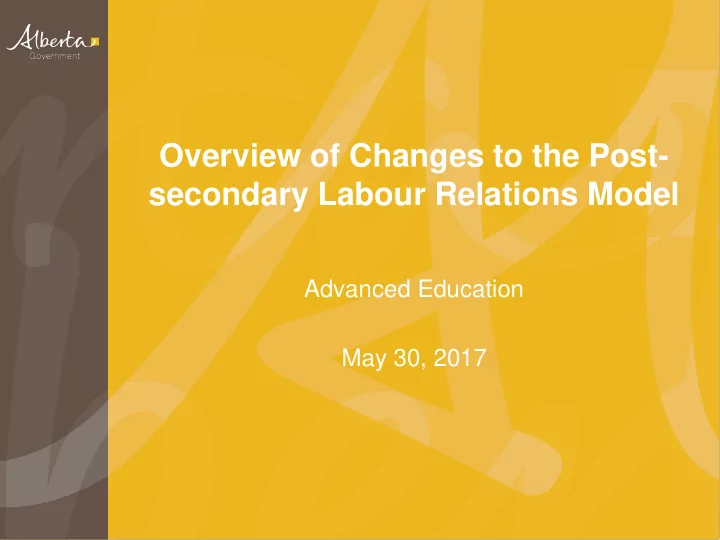

Overview of Changes to the Post- secondary Labour Relations Model Advanced Education May 30, 2017
BACKGROUND & IMPLICATIONS • On May 4, 2017, the Government of Alberta passed Bill 7: An Act to Enhance Post-secondary Academic Bargaining. • History of the development of Bill 7: – 2015 Supreme Court of Canada recognition of workers’ Charter-protected right to strike – Government commitment to modernize Alberta’s labour laws – Post-secondary labour relations review, with stakeholder consultation and advice from Mr. Andrew C.L. Sims, Q.C. to government 2
Key Elements of the New Post- secondary Labour Relations Model The Bargaining Process Essential Services The Status of Academic Staff Associations The Academic Designation Process Transition 3
Collective Bargaining Process for Academic Staff Members Academic staff members are under the strike-lockout collective bargaining model set out in the Labour Relations Code (LRC). Features of the LRC’s Collective Bargaining Model • Collective bargaining impasses may be resolved through strikes or lockouts • Disputes may be referred to voluntary binding arbitration if both parties agree • Provides standardized bargaining procedures and oversight of the Labour Relations Board • A new division has been added to the LRC setting out post-secondary specific provisions 4
Key Collective Bargaining Considerations: • Collective agreements established under the Post- secondary Learning Act (PSLA) - carried over under LRC • Interest arbitration provisions in collective agreements established under the PSLA are not enforceable • Government to work with institutions to establish contingency plans addressing the potential negative impact of a work stoppage on learners • Ensuring time or attention sensitive research is not spoiled during a work stoppage is a common concern for institutions and academic staff members – Other jurisdictions have addressed this outside of legislation 5
Essential Services Provisions The LRC’s essential services provisions (Division 15.1) apply to the post-secondary sector . • Division 15.1 of the LRC defines public services as essential if: – their interruption would endanger the life, personal safety or health of the public, or – they are necessary to the maintenance and administration of the rule of law or public security. • Prior to engaging in a work stoppage, parties must negotiate and file an essential services agreement with the Essential Services Commissioner – Institutions without essential services may apply for an exemption. • Institutions with essential services agreements in place may not employ replacement workers during a work stoppage 6
The Status of Academic Staff Associations Deemed certification of existing academic staff associations under the LRC with a transition period of five or more years: • Academic staff associations remain statutory corporations under the PSLA and deemed as the bargaining agent for their members under the LRC • Decertification and certification of another bargaining agent is prohibited during the transition period • After the transition period, academic staff associations remain the bargaining agent for academic staff members unless their members choose a different bargaining agent • Only impacts academic staff associations in their role as a bargaining agent; all other roles and responsibilities are unaffected. 7
The Academic Designation Process Enhanced consultation requirements and access to the Labour Relations Board: • Board of governors must consult with any affected bargaining agents prior to making designation decisions • Ability to apply to Labour Relations Board if there is a disagreement on a designation decision • Professional academic staff members are not excluded from bargaining unit membership • Labour Relations Board has the authority to determine whether an employee’s managerial duties conflict with their status as a member of the bargaining unit in the context of a collegial governance structure 8
Timing of Transition to New Collective Bargaining Model • Institutions already in arbitration prior to April 6, 2017 will complete that round of bargaining prior to transitioning to the new model. • Institutions not in arbitration by April 6, 2017 will bargain under the new model • Government will work with post-secondary institutions to transition staff to a collective bargaining process • Priority is to ensure minimal impact to students – contingency plans will need to be developed 9
Recommend
More recommend